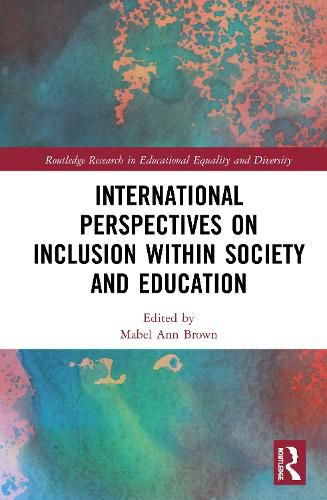Readings Newsletter
Become a Readings Member to make your shopping experience even easier.
Sign in or sign up for free!
You’re not far away from qualifying for FREE standard shipping within Australia
You’ve qualified for FREE standard shipping within Australia
The cart is loading…






International Perspectives on Inclusion within Society and Education explores how the theme of inclusion in education and society plays out across different nations and cultures. Covering topics like dual citizenship, political loyalty, and migration, it includes important discussions around poverty, educational disadvantage, youth radicalisation and inequality.
With perspectives from a wide range of countries, including the USA, UK, Finland, Kosovo, Albania, Poland, Lithuania, Latvia, Hungary, the Czech Republic, Slovakia and India, this book explores how issues of inclusion are often decided by a majority for the majority, which can lead to included minorities feeling disadvantaged and paradoxically excluded. While setting up a strong case for inclusion in society and education, it considers factors such as poverty and mental health both nationally and internationally and evaluates the effectiveness of additional financial resources and educational support in creating an inclusive world.
This book will be of great interest for academics, researchers, and post graduate students in the fields of comparative education, inclusive education, sociology, political sciences and social work.
$9.00 standard shipping within Australia
FREE standard shipping within Australia for orders over $100.00
Express & International shipping calculated at checkout
International Perspectives on Inclusion within Society and Education explores how the theme of inclusion in education and society plays out across different nations and cultures. Covering topics like dual citizenship, political loyalty, and migration, it includes important discussions around poverty, educational disadvantage, youth radicalisation and inequality.
With perspectives from a wide range of countries, including the USA, UK, Finland, Kosovo, Albania, Poland, Lithuania, Latvia, Hungary, the Czech Republic, Slovakia and India, this book explores how issues of inclusion are often decided by a majority for the majority, which can lead to included minorities feeling disadvantaged and paradoxically excluded. While setting up a strong case for inclusion in society and education, it considers factors such as poverty and mental health both nationally and internationally and evaluates the effectiveness of additional financial resources and educational support in creating an inclusive world.
This book will be of great interest for academics, researchers, and post graduate students in the fields of comparative education, inclusive education, sociology, political sciences and social work.